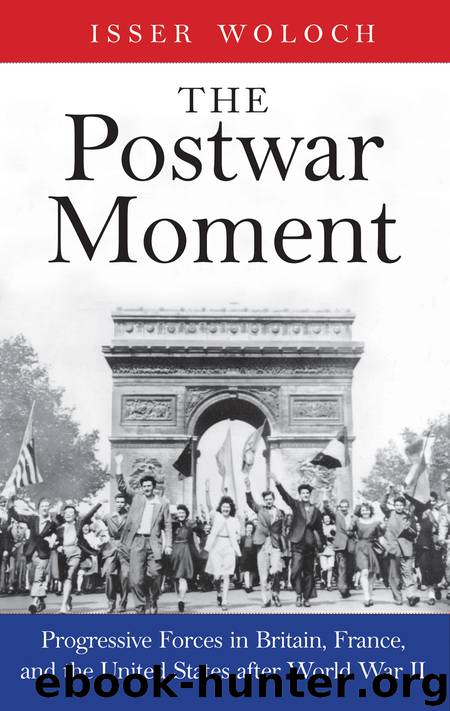The Postwar Moment by Isser Woloch

Author:Isser Woloch
Language: eng
Format: epub
ISBN: 9780300124354
Publisher: Yale University Press
Education: Taproot of Inequality?
There is a grimly ironic and often remarked fact in the history of British education. From seeds planted in a government report of 1926, the Education Act of 1936 had finally raised the school leaving age to fifteen as of September 1, 1939. On that very day, however, German troops invaded Poland, the evacuation of British school children began, and raising the school leaving age was postponed indefinitely.21 Requiring children to remain in school until age fifteen was intended as an entering wedge for efforts to provide secondary schooling distinct from the often mediocre elementary schools in which most British children lingered until the age of fourteen. Now, with the outbreak of war, everything was frozen in place.
In 1941 R. A. Butler, long interested in education, accepted Churchill’s invitation to leave his high profile post with the Foreign Ministry in order to head the Board of Education (the precursor to the Ministry of Education, as renamed in 1944). An upper-class, reform-minded Conservative, Butler understood that rationalizing Britain’s educational system would be crucial to any broader social transformations in the war’s aftermath. Churchill, who had little interest in educational reform, instructed Butler to lead a holding action that kept schools running as best as possible during wartime evacuations, bombings, and geographic displacements. The prime minister reiterated on several occasions that Butler should avoid initiatives that might disrupt the harmony of the coalition government or arouse the historic vested interests embedded in British education. Butler noted those limiting admonitions and quietly ignored them as he set to work in collaboration with his Labour deputy Chuter Ede, who had a background in education and shared the desire to craft a major education act acceptable to the coalition.
Butler succeeded by choosing his priorities. Above all, he negotiated tactfully but persistently with the three religious interest groups (the Anglicans, the Dissenters, and the Roman Catholics) that had historically founded the nation’s elementary schools and still ran about half of them. His creative diplomacy eventually broke the sectarian roadblocks to reforming Britain’s archaic and uneven provision of elementary schooling. Using as leverage the financial straits and deteriorated physical condition of many schools, Butler devised a formula that won over the Anglicans and Dissenters. Each voluntary (i.e., religiously sponsored) school could opt to become a “controlled school”—with all its expenses absorbed by local school boards and rate payers in exchange for oversight, the hiring of most teachers, and a shift to a nondenominational form of Christian religious instruction. If that was unacceptable, a school could instead become an “aided school,” which retained some independence in management and curriculum, and responsibility for roughly half of potentially costly capital expenditures, but with operational costs such as teacher salaries assumed by the local boards. Butler hoped to bring Catholic schools under the same umbrella of greater control in exchange for public financing, but he found no willing partners in negotiations with Catholic bishops and notables.22
With this major if incomplete rationalization of elementary schooling settled, Butler avoided overreach on other issues that might doom his whole project.
Download
This site does not store any files on its server. We only index and link to content provided by other sites. Please contact the content providers to delete copyright contents if any and email us, we'll remove relevant links or contents immediately.
The Secret History by Donna Tartt(18949)
The Social Justice Warrior Handbook by Lisa De Pasquale(12169)
Thirteen Reasons Why by Jay Asher(8848)
This Is How You Lose Her by Junot Diaz(6836)
Weapons of Math Destruction by Cathy O'Neil(6220)
Zero to One by Peter Thiel(5736)
Beartown by Fredrik Backman(5682)
The Myth of the Strong Leader by Archie Brown(5460)
The Fire Next Time by James Baldwin(5386)
How Democracies Die by Steven Levitsky & Daniel Ziblatt(5175)
Promise Me, Dad by Joe Biden(5114)
Stone's Rules by Roger Stone(5053)
A Higher Loyalty: Truth, Lies, and Leadership by James Comey(4908)
100 Deadly Skills by Clint Emerson(4882)
Rise and Kill First by Ronen Bergman(4741)
Secrecy World by Jake Bernstein(4703)
The David Icke Guide to the Global Conspiracy (and how to end it) by David Icke(4658)
The Farm by Tom Rob Smith(4467)
The Doomsday Machine by Daniel Ellsberg(4452)
